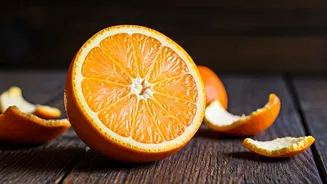Vision and Nutrition
The health of your eyes is intricately linked to what you consume, a fact often overlooked in daily life. Just like other parts of your body, your eyes require
a steady supply of essential nutrients to function optimally and ward off potential problems. A balanced diet rich in specific vitamins, minerals, and antioxidants can significantly reduce the risk of vision loss and age-related eye diseases. Focusing on specific foods can provide protection. Considering this, incorporating certain foods into your meals can enhance your eye health. These foods are rich in nutrients known to benefit vision and protect the eyes from damage. By choosing the right foods, you can take a proactive approach towards preserving and strengthening your eyesight.
Spinach's Eye Benefits
Spinach is a powerhouse of nutrients, and it shines when it comes to eye health. It's packed with lutein and zeaxanthin, powerful antioxidants that accumulate in the retina, acting as a natural shield against the damaging effects of blue light and free radicals. These antioxidants also help prevent age-related macular degeneration (AMD) and cataracts. Include spinach in your diet through salads, smoothies, or cooked dishes to give your eyes an extra layer of protection. These vital components offer remarkable protection and significantly improve overall eye function. As a result, spinach offers a simple, and delicious way to preserve and improve your eye health.
Olive Oil's Role
Olive oil, a staple in many kitchens, contributes to eye health through its rich antioxidant content. It contains vitamin E, a potent antioxidant that protects cells, including those in the eyes, from oxidative stress. Regular consumption of olive oil can help reduce the risk of eye diseases and support overall visual function. Using olive oil in your cooking or as a salad dressing is an easy way to incorporate its benefits into your daily routine. By adding olive oil to your meals, you can actively boost your vision and strengthen its protective capabilities, therefore ensuring long-term eye health.
Red Peppers' Nutrients
Sweet red peppers are an excellent source of vitamin C, another crucial antioxidant for eye health. Vitamin C helps protect the eyes from damage caused by free radicals and may also reduce the risk of cataracts. These peppers are also a good source of vitamin A, which is essential for healthy vision, particularly in low-light conditions. The rich nutrients present are crucial for eye function. Whether raw in salads, roasted, or added to various dishes, red peppers provide a vibrant and healthy addition to your diet. Integrating these peppers into your meals provides a simple method for boosting your vision and general health.
Almonds and Vision
Almonds are packed with vitamin E, a fat-soluble antioxidant vital for maintaining healthy eyes. Vitamin E helps protect the cells in your eyes from damage caused by free radicals, potentially reducing the risk of age-related macular degeneration and cataracts. Including almonds in your diet as a snack or adding them to your meals is a simple way to support your eye health. Almonds' nutrient profile makes them a beneficial food choice for protecting your eyesight and supporting overall well-being. Consuming a handful of almonds daily offers a readily accessible path toward strengthening and protecting your vision.
Sunflower Seeds Perks
Sunflower seeds are another excellent source of vitamin E. Like almonds, these seeds contribute significantly to your eye health by shielding cells from damage. The vitamin E found in sunflower seeds can help protect against age-related eye conditions. Incorporating these seeds into your diet offers a delicious and straightforward way to provide your eyes with the protection they need. The nutrients in sunflower seeds contribute greatly to maintaining and improving vision, thus highlighting the significance of adding them to your diet.
Avocados for Eyes
Avocados are a nutritional goldmine. They contain lutein, an antioxidant vital for eye health, which can help shield the eyes from the harm caused by blue light and free radicals. By adding avocados to your diet, you provide your eyes with crucial support for preserving visual function. Whether in a salad, smoothie, or as a spread, avocados make a nutritious and fulfilling addition to your meals. Including avocados in your meals guarantees that your eyes get vital nutrients and assists in maintaining optimal eye health for the long term.
Hazelnuts and Sight
Hazelnuts also contribute to eye health due to their vitamin E content. Vitamin E in hazelnuts protects the eyes from oxidative stress and free radical damage. Eating hazelnuts can offer additional protection for your eyes, lessening the risk of age-related eye diseases. By incorporating hazelnuts into your daily meals, you're investing in your visual health. This simple dietary adjustment can help maintain robust eyesight and ensure the well-being of your eyes. Hazelnuts give an easily accessible and tasty way to improve and safeguard your eyesight.













